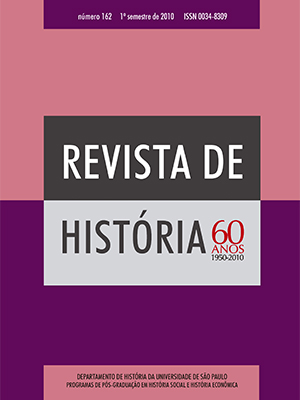Tudo consiste em dívidas, em créditos e em contas: relações de crédito no Brasil colônia; Curitiba na primeira metade do século XVIII
DOI:
https://doi.org/10.11606/issn.2316-9141.v0i162p105-129Keywords:
debt overdue, ordinary judges, debt/credit networksAbstract
Recent historiography on colonial Brazil has destroyed several myths inherited from classic works, such as the notion of large properties functioning in an autarchic way, or the exclusively endogenous accumulation of capital. It is consensual now a days that there were internal networks of merchandise and accumulation strongly anchored in credit/debt networks. The vast majority of studies available on the theme focused the main commercial cities, Rio de Janeiro in particular. This article tries to assess how a small, peripheral place such as the village of Curitiba was integrated in such networks, from the analysis of an unexpected source: the minutes of the village ordinary judges' audiences. The predominance of processes referring to debts overdue allows us to see some aspects of the credit threads put together in the southern part of the Brazilian colony.Downloads
Download data is not yet available.
Downloads
Published
2010-06-30
Issue
Section
Articles
License
Autores que publicam nesta revista concordam com os seguintes termos:
- Autores mantém os direitos autorais e concedem à revista o direito de primeira publicação, com o trabalho simultaneamente licenciado sob a https://creativecommons.org/licenses/by/4.0/ (CC BY). Esta licença permite que outros distribuam, remixem, adaptem e criem a partir do seu trabalho, mesmo para fins comerciais, desde que lhe atribuam o devido crédito pela criação original. É a licença mais flexível de todas as licenças disponíveis. É recomendada para maximizar a disseminação e uso dos materiais licenciados.
- Autores têm autorização para assumir contratos adicionais separadamente, para distribuição não-exclusiva da versão do trabalho publicada nesta revista (ex.: publicar em repositório institucional ou como capítulo de livro), com reconhecimento de autoria e publicação inicial nesta revista.
- Autores têm permissão e são estimulados a publicar e distribuir seu trabalho online (ex.: em repositórios institucionais ou na sua página pessoal) a qualquer ponto antes ou durante o processo editorial, já que isso pode gerar alterações produtivas, bem como aumentar o impacto e a citação do trabalho publicado (veja O Efeito do Acesso Livre).
How to Cite
PEREIRA, Magnus Roberto de Mello; BORGES, Joacir Navarro. Tudo consiste em dívidas, em créditos e em contas: relações de crédito no Brasil colônia; Curitiba na primeira metade do século XVIII. Revista de História, São Paulo, n. 162, p. 105–129, 2010. DOI: 10.11606/issn.2316-9141.v0i162p105-129. Disponível em: https://www.journals.usp.br/revhistoria/article/view/19153.. Acesso em: 24 may. 2024.







